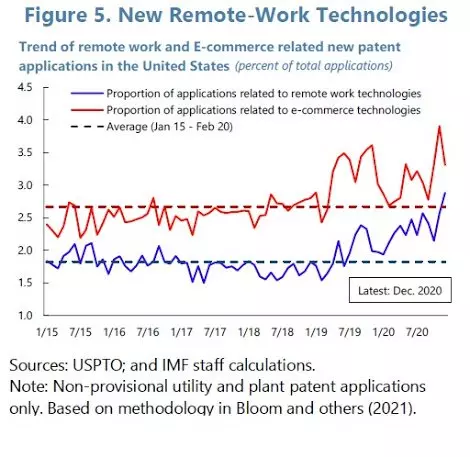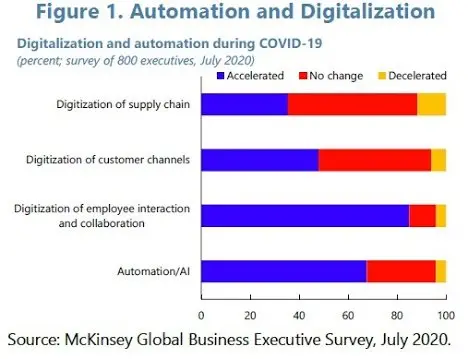Comments
- No comments found

We know that the pandemic caused people and firms to make much more widespread use of digital technologies: working from home, ordering on-line, tele-medicine, education from K-12 to college delivered on-line, and so on.
Indeed, it seems likely that this surge of digital activity is also providing an incentive for substantial investments in physical capital, intangible capital (like software), and complementary human skills to make use of these investment. Might these shifts in patterns and investments provide a boost to improved productivity growth in the next few years?
The Group of Twenty has published a report (prepared by staff at the IMF) on these subject: "Boosting Productivity in the Aftermath of COVID-19" (June 2021). The report suggests the possibility that while many people will be better off because of the shift to digital technologies, these gain in well-being may not be well-reflected in conventional economic statistics like GDP.
It's worth noting that nothing in the report seeks to put a happy face on the economic side of the pandemic experience. Unemployment has soared. Worker skills have been unused, and in some cases will have depreciated. Firms and communities have suffered, many of them grievously. As the report notes: "For instance, the so called `jobless recoveries' from previous US recessions were driven by contractions in routine occupations, which account for about 50 percent of total employment, that are never recovered. More recently, the COVID-19 shock has also hit sectors that are more vulnerable to automation much harder and lowered the share of low-skilled and low-wage workers in the workforce. As we look ahead, the productivity and earnings of low-skilled workers that have lost their jobs in sectors vulnerable to automation are therefore at risk ..."
But it is also true that use of digital technologies has increased, in ways that seem likely to persist, at least in part, as the pandemic recession faced. Indeed, this shift to heavier use of digital technologies is one reason why stock prices of leading tech companies have done so well in the last year or so. Here are a couple of interesting illustrations from the report. The first shows the pattern of new US patent applications related to remote work and e-commerce, and how it has risen. The second shows the results of a survey of business executives, emphasizing that for most of them, the pandemic recession led to heightened efforts to digitize and automate their operations.


The report discusses the extent to which this shift may increase productivity: for example, the reallocation of resources away from less-productive to more-productive firms should boost productivity. The report expresses cautious and hedged optimism about the chances for productivity: for example, "In sum, the impact of reallocation so far looks beneficial for productivity, but much remains to be learned and it is associated with several concerns."
The report also raises the difficult question of productivity measurement. Workers who have greater flexibility to work from home may benefit, for example, from less time spent commuting. But shorter commutes don't provide a direct boost to JEP. If I have groceries delivered more often, but my purchase of groceries is pretty much the same, the benefits to me may not be well-captured by conventional economic statistics. If I see my doctor on-line, or children see a K-12 teacher online, or college students attend classes remotely, there will be a mixture of effects on the quality of what is provided and the costs of providing it that will not translate in a simple way into productivity statistics. These kinds of issues have been lurking in the productivity statistics for years, but the economic after-effects of the pandemic may strengthen them.
Mismeasurement of the digital economy has been an often-cited contributor to the prolonged slowdown in measured productivity growth prior to the COVID-19 pandemic. As the productivity slowdown occurred alongside a fast pace of innovation in the hard-to-measure digital economy, a commonly mentioned contributor to the measured slowdown is the inability to capture well in price statistics and deflators the increases in convenience, varieties, free online products, and lower quality-adjusted prices that arises from the digital economy. ... Looking forward, if the pandemic accelerates growth in the digital economy, its contribution to mismeasurement may become more salient. For example, greater prevalence of remote work and online interactions across borders may reduce travel costs, which, if not properly captured, may lead to an underestimation of productivity growth. A shift to digital and peer-to-peer platforms could also bring added convenience, making it feasible to access an increasing number of varieties and lower prices, which, if not properly accounted for, would also result in mismeasurement.
Finally, it's worth noting that the pandemic will affect future productivity growth in a number of ways, not just via the effects on digitalization. For example, many students around the world have experienced a severe disruption of their education. The report notes:
School closures affected 1.6 billion learners globally at the peak of the pandemic and continue to disrupt learning for millions. These disruptions had disproportionately adverse impacts on schooling in economies with preexisting gaps in infrastructure (such as access to electricity and internet), which constrained their ability to implement remote learning. Girls and learners in low-income households faced disproportionately greater risk of learning losses as they lost a boost from peer-effects that occur in school and may have been less likely to have parental support for remote learning. Women may also have needed to take on additional caregiving and teaching responsibilities while at home, putting them at a disadvantage in the labor market. These interruptions to learning and work will likely set back human capital accumulation—with such effects spread unevenly across generations, genders, and income levels, and with adverse implications for longer-run productivity.
Timothy Taylor is an American economist. He is managing editor of the Journal of Economic Perspectives, a quarterly academic journal produced at Macalester College and published by the American Economic Association. Taylor received his Bachelor of Arts degree from Haverford College and a master's degree in economics from Stanford University. At Stanford, he was winner of the award for excellent teaching in a large class (more than 30 students) given by the Associated Students of Stanford University. At Minnesota, he was named a Distinguished Lecturer by the Department of Economics and voted Teacher of the Year by the master's degree students at the Hubert H. Humphrey Institute of Public Affairs. Taylor has been a guest speaker for groups of teachers of high school economics, visiting diplomats from eastern Europe, talk-radio shows, and community groups. From 1989 to 1997, Professor Taylor wrote an economics opinion column for the San Jose Mercury-News. He has published multiple lectures on economics through The Teaching Company. With Rudolph Penner and Isabel Sawhill, he is co-author of Updating America's Social Contract (2000), whose first chapter provided an early radical centrist perspective, "An Agenda for the Radical Middle". Taylor is also the author of The Instant Economist: Everything You Need to Know About How the Economy Works, published by the Penguin Group in 2012. The fourth edition of Taylor's Principles of Economics textbook was published by Textbook Media in 2017.
Leave your comments
Post comment as a guest